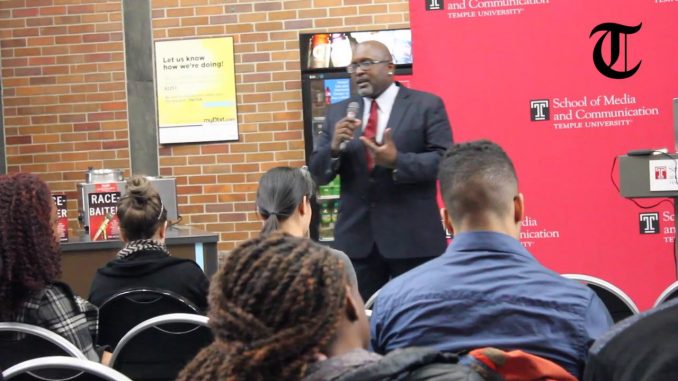
NPR TV critic talks race and media


When Eric Deggans studied political science and journalism at Indiana University in the late 1980s, he was also a drummer on the side.
He and his band played shows and recorded music as part of the dissent movement against South African apartheid, a form of racial segregation through which the white Afrikaner minority, which held heavy legislative influence, could dominate the black majority in the country from 1948-94.
Years after South Africa has been integrated, Deggans, the first full-time TV critic at National Public Radio and a published author, drums less and talks more about race and the media.
In the atrium of Annenberg Hall last Tuesday evening, Deggans hosted “Decoding the Race Baiting of Modern Media,” about how to recognize and combat racism and stereotypes in the media. Deggans spoke to an audience of around 50 students and faculty about his book, “Race-Baiter,” and his experiences working in public media.
Across the nation, college students have taken part in die-ins and other forms of protest about race relations in America, first stemming from the tension in Ferguson, Missouri when teen Michael Brown was shot by Officer Darren Wilson on Aug. 9, 2014. Deggans said he still believes in the importance of student involvement in affecting social change.
“I love to see it because it shows that students are engaged in the world, which I think is really important,” he said. “I also think it’s really important for students to push back the stereotype that they don’t care about the world around them and that they’re self-satisfied and self-focused.”
Deggans said social media plays a large role in social-justice movements for the current generation. He cited Trayvon Martin’s death in 2012 as a major turning point in social media’s importance.
“It wasn’t just about spreading hashtags, it was letting people know when a protest was coming, about an online petition they could sign, about the latest developments in the case so they could click a link and read the story,” Deggans said. “It was about getting people emotionally engaged so they could go out and react wherever they were.”
While most current college students have the benefit of instant access to information, Deggans said young people still need to be critical thinkers about what they consume, something his generation didn’t really have to deal with when they were young.
Of the recent controversy at the University of Oklahoma’s Sigma Alpha Epsilon fraternity which had a video of a racist chant posted to the internet, Deggans said that bystander intervention is a method of preventing further similar behavior.
“What this says to me is there are pockets of kids who aren’t paying attention to these issues and maybe taking it for granted,” he said. “When these issues emerge in your everyday life, you have to have the strength to challenge them. If you’re on a bus when somebody starts a chant like that, you have to be the person that stands up and says ,‘I’m not doing that.’”
In his presentation, Deggans explained racism and stereotypes in the media and interacted with the audience under the main guideline of “everyone gets respect.” He outlined instances in the media including scenes from reality TV show Big Brother and Fox News that he said displayed racial bias and described why they did.
Audience members were able to answer questions that Deggans posed, as well as ask their own. They also participated in a quiz about statistics for a chance to receive a free copy of Deggans’ book.
David Boardman, dean of the School of Media and Communication, said Deggans was an old friend of his.
“This sort of conversation is so important and rare,” Boardman said. “They are difficult topics to talk about and [Deggans] has a gift to be enlightening. I was also gratified by the great questions.”
Veronica Ayala, a junior architecture major, said that she also enjoyed the presentation.
“It’s great that Temple hosts these dialogues, especially someone who is so open and talking about something that affects us all,” she said.
Lian Parsons can be reached at lian.parsons@temple.edu or on Twitter @Lian_Parsons.
Copyright 2018 The Temple News.
Be the first to comment